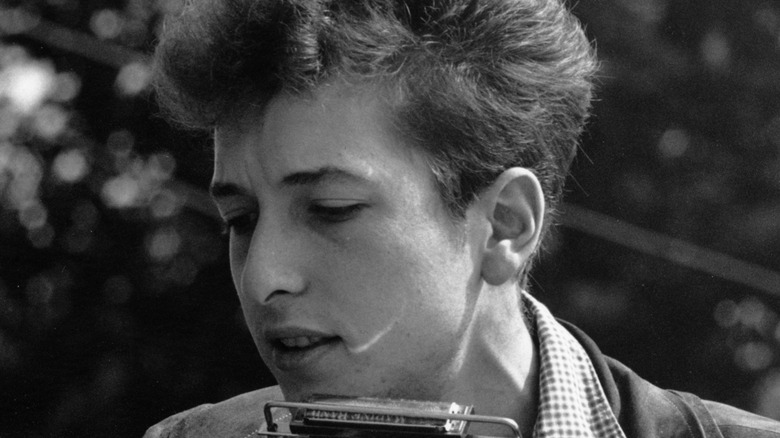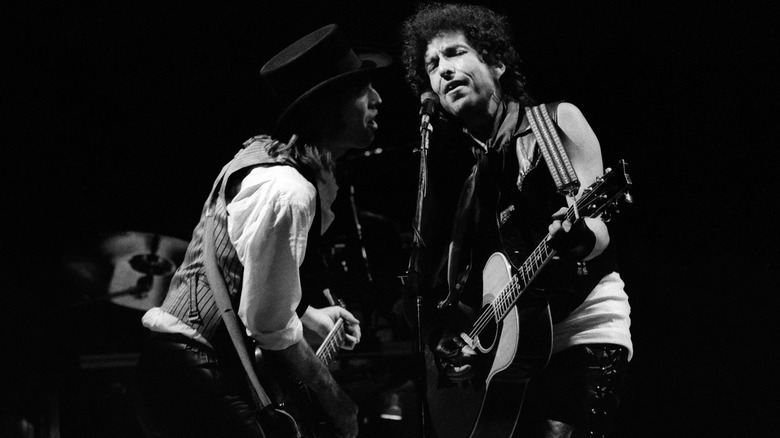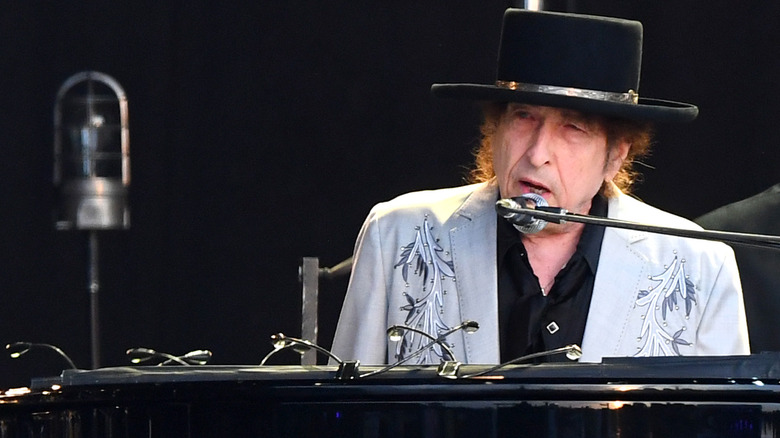The Philosophical Meaning Behind Bob Dylan's All Along The Watchtower
Out of the entirety of Bob Dylan's catalogue of songs, "All Along the Watchtower" remains the acclaimed singer-songwriter's most enigmatic track. Far from the obviousness of political songs like 1963's blatantly antiwar "Masters of War," or 1964's civil rights-aligned "The Times They Are a-Changin'," "All Along the Watchtower" is a bundle of mysterious imagery, striking poetics, Biblical allusions, and deliberately veiled messaging. Of course it makes sense that folks would pay \special attention to Bob Dylan's lyrics, as lyrical depth was always one of his hallmarks. And because Dylan has never explained what "All Along the Watchtower" is about, the song has generated even more speculation about its meaning and purpose.
Even to this day, each Bob Dylan fan seems to have a different interpretation of "All Along the Watchtower." Bob Dylan Song Analysis states that the song is about "corruption and privilege," citing the contrast between the song's "ploughman" and "businessman." American Songwriter goes one pious step further and says that the song is about how life ought to be "a poetic sacrifice" rather than a reflection of "callous consumerism." Sites like Far Out Magazine and Reason to Rock give verse-by-verse blow-by-blows of the song, and tie it into Dylan's life at the time of its writing; they even dig into particulars like adverb choices. In the end, we can only analyze and speculate so much — that's part of the magic of art. Only Bob Dylan knows precisely what "All Along the Watchtower" is actually about.
Go set a watchman
One of the most common interpretations of Bob Dylan's "All Along the Watchtower" connects to the Bible, specifically the Old Testament's Isaiah, chapter 21, verses five through nine. And it's true that there's some undeniably similar, if not identical imagery and vocabulary shared between the two. Per Bible Gateway, Isaiah 21: 5 – 9 in part reads, "Go, set a watchman; let him announce what he sees. When he sees riders, horsemen in pairs, riders on donkeys, riders on camels, let him listen diligently, very diligently." Per Genius, the last verse of "All Along the Watchtower" reads, "All along the watchtower / Princes kept the view," and ending, "Two riders were approaching / The wind began to howl."
Based on even only those passages, Dylan's song sounds like a remixed version of the Bible, or an extension of the Bible's story with some different details. The biblical version describes the watchman keeping an eye out for the fate of Babylon, ending with the lines, "Fallen, fallen is Babylon; and all the carved images of her gods he has shattered to the ground." Because we in the modern day colloquially use "Babylon" as shorthand for the follies of decadence and idolatry, this is why folks like that on Bob Dylan Song Analysis describe the song as being about societal corruption. In this interpretation, the inclusion of the joker and thief characters — around whom the song revolves — signify two wayward approaches to life: foolishness and greed.
Enduring value and meaning
There are other elements of Bob Dylan's "All Along the Watchtower" that employ blatantly biblical allusions: the "hour getting late," the thief being like the thief next to Jesus on Golgotha, comparisons between "my wine" and "my earth" and how Old Testament prophets talked, and so on, as Bob Dylan Song Analysis. Analyses go far, far deeper than this, though. Reason to Rock talks about characters, objects, and locations in the song representing historical archetypes, while Far Out Magazine turns the lens more towards the United States, and says that the song "provided a message that usurped spiritual vapidness and despondent nihilism that pervaded an era of despair in America." But in the end, such analyses might miss the point. Is "All Along the Watchtower" made more meaningful if we pin down one, specific version of Dylan's intentions?
In fact, it's exactly because the song is open to interpretation that it's developed such a longtime, even generational, following. This tells us a lot, in and of itself, about the definition of "meaning," and whether the value in music, art, writing, etc., derives from and/or requires perfect clarity of understanding. Besides, any artist who's being truthful will say that meaning often comes after intentionality. There's the flow of words and feeling, and then maybe the artist understands what it was all about later — maybe. But perhaps that's the definition of a gift or talent: being able to give the unconscious enough space to bubble to the surface.


